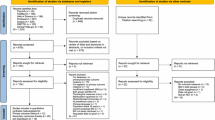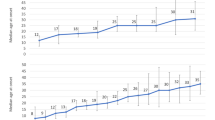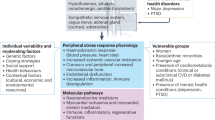Abstract
Objective
Evaluate the effect of parental protective factors on parental stress at time of NICU admission and prior to discharge.
Study design
Parents of infants born at <35 weeks gestation were approached at a single level III NICU. Consenting parents completed a questionnaire on admission and prior to infant’s discharge of demographic information and three validated instruments: (1) parental stress (PSS:NICU), (2) Parents’ Assessment of Protective Factors (PAPF), and (3) health literacy (PHLAT-8).
Results
Mean PSS:NICU Total score was 2.8 ± 0.9 (Time 1) and 2.6 ± 1.1 (Time 2). Mean PAPF scores in all subcategories were high (means >3, ±0.3–0.5) (Time 1, Time 2). There was no clinically significant association between PSS:NICU scores and PAPF or any of the other measured variables.
Conclusion
PAPF and other commonly implicated factors were not associated with perceived self-reported parental stress at time of NICU admission and prior to discharge.
This is a preview of subscription content, access via your institution
Access options
Subscribe to this journal
Receive 12 print issues and online access
$259.00 per year
only $21.58 per issue
Buy this article
- Purchase on Springer Link
- Instant access to full article PDF
Prices may be subject to local taxes which are calculated during checkout

Similar content being viewed by others
References
Dudek-Shriber L. Parent stress in the neonatal intensive care unit and the influence of parent and infant characteristics. Am J Occup Ther. 2004;58:509–20.
Ionio C, Colombo C, Brazzoduro V, Mascheroni E, Confalonieri E, Castoldi F, et al. Mothers and fathers in NICU: the impact of preterm birth on parental distress. Eur J Psychol. 2016;12:604–21.
Lasiuk GC, Comeau T, Newburn-Cook C. Unexpected: an interpretive description of parental traumas’ associated with preterm birth. BMC Pregnancy Childbirth. 2013;13:S13.
Spear ML, Leef K, Epps S, Locke R. Family reactions during infants’ hospitalization in the neonatal intensive care unit. Am J Perinatol. 2002;19:205–13.
Chourasia N, Surianarayanan P, Adhisivam B, Vishnu Bhat B. NICU admissions and maternal stress levels. Indian J Pediatr. 2013;80:380–4.
Mackley AB, Locke RG, Spear ML, Joseph R. Forgotten parent: NICU paternal emotional response. Adv Neonatal Care. 2010;10:200–3.
Schappin R, Wijnroks L, Uniken Venema MM, Jongmans MJ. Rethinking stress in parents of preterm infants: a meta-analysis. PLoS ONE. 2013;8:e54992.
Palma E, Von Wussow F, Morales I, Cifuentes J, Ambiado S. Stress in parents of newborns hospitalized in a neonatal intensive care unit. Rev Chil Pediatr. 2017;88:332–9.
Mackley A, Winter M, Guillen U, Paul DA, Locke R. Health literacy among parents of newborn infants. Adv Neonatal Care. 2016;16:283–8.
Carter JD, Mulder RT, Darlow BA. Parental stress in the NICU: the influence of personality, psychological, pregnancy and family factors. Personal Ment health. 2007;1:40–50.
Kynø NM, Ravn IH, Lindemann R, Smeby NA, Torgersen AM, Gundersen T. Parents of preterm-born children; sources of stress and worry and experiences with an early intervention programme–a qualitative study. BMC Nurs. 2013;12:28.
Pilcher J, Flanders S. Who is Billy Reuben? Health literacy and patient education. Neonatal Netw. 2014;33:150–4.
Umasankar N, Sathiadas M. Maternal stress level when a baby is admitted to the neonatal intensive care unit at Teaching Hospital Jaffna and the influence of maternal and infant characteristics on this level. Sri Lanka J Child Health. 2016;45:90–4.
Brooks S, Rowley S, Broadbent E, Petrie KJ. Illness perception ratings of high-risk newborns by mothers and clinicians: relationship to illness severity and maternal stress. Health Psychol. 2012;31:632–9.
Ashwani N, Rekha N, Kumar C. Parental stress experiences with NICU admission in a tertiary care centre. Int J Psychol Behav Sci. 2017;7:27–31.
Franck LS, Cox S, Allen A, Winter I. Measuring neonatal intensive care unit-related parental stress. J Adv Nurs. 2005;49:608–15.
McIntosh BJ, Stern M, Ferguson KS. Optimism, coping, and psychological distress: maternal reactions to NICU hospitalization. Children’s Health Care. 2004;33:59–76.
Kiplinger VL, Browne CH. Parents’ assessment of protective factors: User’s guide and technical report. Washington, DC: Center for the Study of Social Policy; 2014.
Seideman RY, Watson MA, Corff KE, Odle P, Haase J, Bowerman JL. Parent stress and coping in NICU and PICU. J Pediatr Nurs. 1997;12:169–77.
Loewenstein K, Barroso J, Phillips S. The experiences of parents in the neonatal intensive care unit: an integrative review of qualitative studies within the transactional model of stress and coping. J Perinat Neonatal Nurs. 2019;33:340–9.
Rossman B, Greene MM, Kratovil AL, Meier PP. Resilience in Mothers of very-low-birth-weight infants hospitalized in the NICU. J Obstet Gynecol Neonatal Nurs. 2017;46:434–45.
Shaw RJ, Bernard RS, Storfer-Isser A, Rhine W, Horwitz SM. Parental coping in the neonatal intensive care unit. J Clin Psychol Med Settings. 2013;20:135–42.
Hagen IH, Iversen VC, Svindseth MF. Differences and similarities between mothers and fathers of premature children: a qualitative study of parents’ coping experiences in a neonatal intensive care unit. BMC pediatrics. 2016;16:92.
Smith VC, Steelfisher GK, Salhi C, Shen LY. Coping with the neonatal intensive care unit experience: parents’ strategies and views of staff support. J Perinat Neonatal Nurs. 2012;26:343–52.
Miles MS, Funk SG, Carlson J. Parental Stressor Scale: neonatal intensive care unit. Nurs Res. 1993;42:148–52.
Miles MS, Holditch-Davis D, Schwartz TA, Scher M. Depressive symptoms in mothers of prematurely born infants. J Dev Behav Pediatr. 2007;28:36–44.
Kumar D, Sanders L, Perrin EM, Lokker N, Patterson B, Gunn V, et al. Parental understanding of infant health information: health literacy, numeracy, and the Parental Health Literacy Activities. Test (PHLAT) Acad Pediatr. 2010;10:309–16.
Yin HS, Sanders LM, Rothman RL, Mendelsohn AL, Dreyer BP, White RO, et al. Assessment of health literacy and numeracy among Spanish-Speaking parents of young children: validation of the Spanish Parental Health Literacy Activities. Test (PHLAT Span) Acad Pediatr. 2012;12:68–74.
Richardson DK, Corcoran JD, Escobar GJ. Lee SKSNAP-II and SNAPPE-II: simplified newborn illness severity and mortality risk scores. J Pediatr. 2001;138:92–100.
Doupnik SK, Hill D, Palakshappa D, Worsley D, Bae H, Shaik A, et al. Parent coping support interventions during acute pediatric hospitalizations: a meta-analysis. Pediatrics. 2017;140:1–16.
Boyden JY, Hill DL, Carroll KW, Morrison WE, Miller VA, Feudtner C. The association of perceived social support with anxiety over time in parents of children with serious illnesses. J Palliat Med. 2020;23:527–34.
Isokaanta S, Koivula K, Honkalampi K, Kokki H. Resilience in children and their parents enduring pediatric medical traumatic stress. Paediatr Anaesth. 2019;29:218–25.
Rothschild CB, Rychlik KL, Goodman DM, Charleston E, Brown ML, Michelson KN, et al. Association between resilience and psychological morbidity in parents of critically Ill children. Pediatr Crit Care Med| Soc Crit Care Med. 2020;21:e177–e185.
Stremler R, Haddad S, Pullenayegum E, Parshuram C. Psychological outcomes in parents of critically Ill hospitalized children. J Pediatr Nurs. 2017;34:36–43.
Gage EA. The dynamics and processes of social support: families’ experiences coping with a serious paediatric illness. Socio Health Illn. 2013;35:405–18.
Kasser SL, Zia A. Mediating role of resilience on quality of life in individuals with multiple sclerosis: a structural equation modeling approach. Arch Phys Med Rehabil. 2020;101:1152–61.
Palacio C, Limonero JT. The relationship between the positive aspects of caring and the personal growth of caregivers of patients with advanced oncological illness: postraumattic growth and caregiver. Support Care Cancer. 2020;28:3007–13.
Hughes M-a, McCollum J, Sheftel D, Sanchez G. How parents cope with the experience of neonatal intensive care. Children’s Health Care. 1994;23:1–14.
Miles M, Carlson J, Funk S. Sources of support reported by mothers and fathers of infants hospitalized in a neonatal intensive care unit. Neonatal Netw: NN. 1996;15:45–52.
Ferrand A, Gorgos A, Ali N, Payot A. Resilience rather than medical factors: how parents predict quality of life of their sick newborn. J Pediatrics. 2018;200:64–70.e65.
Author information
Authors and Affiliations
Contributions
AI was the principal investigator and was primarily responsible for manuscript preparation. UG contributed to research methodology and manuscript editing. AM contributed to research methodology, assisted with subject enrollment, and manuscript editing. RL contributed to research methodology, was primarily responsible for statistical analysis, and contributed to manuscript editing. WS was the mentor for the study and contributed to research methodology and manuscript editing.
Corresponding author
Ethics declarations
Conflict of interest
The authors declare that they have no conflict of interest.
Additional information
Publisher’s note Springer Nature remains neutral with regard to jurisdictional claims in published maps and institutional affiliations.
Rights and permissions
About this article
Cite this article
Ivashchuk, A., Guillen, U., Mackley, A. et al. Parental protective factors and stress in NICU mothers and fathers. J Perinatol 41, 2000–2008 (2021). https://doi.org/10.1038/s41372-020-00908-4
Received:
Revised:
Accepted:
Published:
Issue Date:
DOI: https://doi.org/10.1038/s41372-020-00908-4
This article is cited by
-
Parental resilience and psychological distress in the neonatal intensive care unit
Journal of Perinatology (2022)



